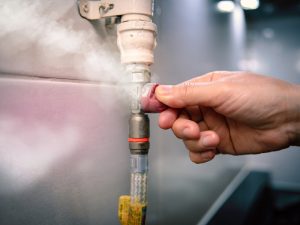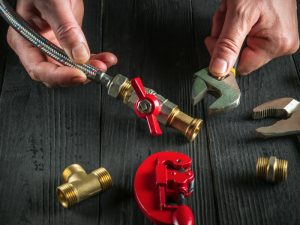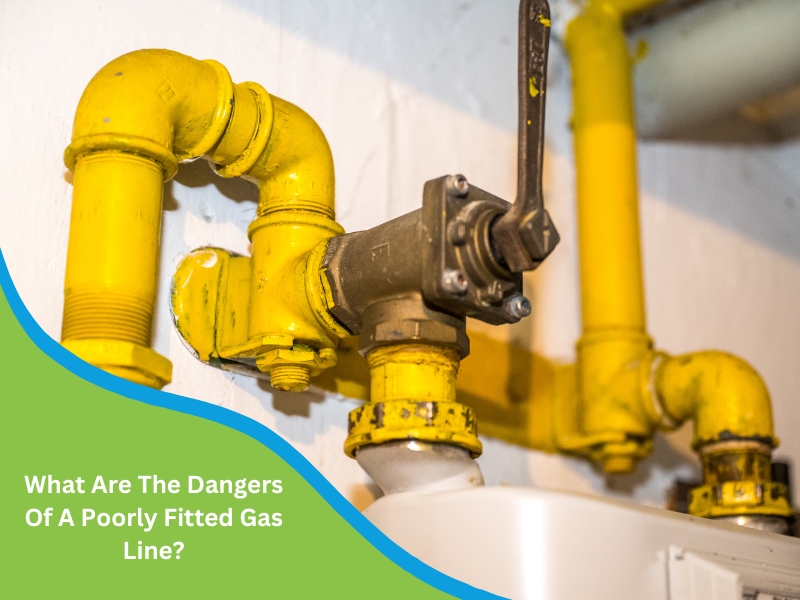A poorly fitted gas line is more than just a minor inconvenience – it can be a significant hazard to your safety and well-being. Whether you’ve just moved into a new home or are renovating, ensuring your gas lines are installed correctly is crucial. Not only do improper fittings increase the risk of leaks, but they also pose long-term dangers to your home, appliances, and health. Understanding these risks and spotting potential issues early can help protect you, your family, and your property.
How can you tell if a gas line is poorly fitted?
Identifying a poorly fitted gas line early can prevent many dangerous situations. Here are a few signs that suggest your gas line might not have been installed correctly:
- Hissing sounds: If you hear a hissing noise near gas appliances, it could mean a leak due to improper installation.
- Unusual smells: A sulphur or rotten egg smell is a strong indicator of a gas leak, which could result from a poor fit.
- Unexplained gas bills: If your gas consumption seems unusually high, a poorly fitted line may leak gas, causing wastage.
- Visible damage: Cracks, dents, or damage to the gas line may indicate poor installation or wear over time.
- Corrosion: Corrosion on or around the gas line fittings can signal faulty installation or degradation of materials used.
Recognising the signs of a poorly fitted gas line early can help prevent leaks and potential hazards in your home. Be mindful of unusual smells, sounds, or rising gas bills.
What are the risks of a poorly fitted gas line?
A poorly fitted gas line can lead to several risks that endanger your home and health. These include:
- Gas leaks: One of the most dangerous consequences of a poorly fitted gas line is the potential for gas leaks. Even minor leaks can cause significant issues like explosions or poisoning. It’s important to explore the dangers of propane gas leaks, as they can lead to severe health issues, fire hazards, and even explosions if left undetected.

- Fire hazards: Gas lines that aren’t correctly installed can spark fires, and leaks around appliances such as stoves or water heaters are hazardous.
- Explosions: A poorly fitted gas line can create an environment where gas accumulates in dangerous amounts, which can result in an explosion when ignited.
Poorly fitted gas lines pose serious risks such as gas leaks, fire hazards, explosions, and carbon monoxide poisoning. Taking early action can protect your home and family.
Does a poorly installed gas line increase fire risks?
A poorly installed gas line can significantly increase your home’s fire risk. When the line is not fitted securely or is improperly connected, the gas can leak and come into contact with open flames or electrical sparks, leading to fire hazards.
Cause of Fire Risk | Explanation |
Gas Leaks | Leaking gas is highly flammable and can ignite from a spark, open flame, or even static electricity. |
Improperly Sealed Connections | If joints and connections aren’t correctly sealed, gas can escape, increasing the likelihood of fire. |
Old, Worn-out Pipes | Old or corroded gas lines are more likely to crack, leading to gas leaks and fire hazards. |
It’s important to understand that the fire risk is not limited to cooking areas; any appliance connected to a gas line can trigger a fire if the installation is incorrect.
How can a faulty gas line lead to health issues?
A faulty gas line doesn’t just pose a risk to your home – it can also harm your health. If gas leaks from a poorly fitted line, it can lead to:
- Carbon monoxide poisoning: Carbon monoxide (CO) is a dangerous by-product of burning gas. Suppose the gas line leaks CO into your home. In that case, it can lead to poisoning, causing symptoms such as headaches, dizziness, confusion, nausea, and even death in severe cases.
- Chronic respiratory issues: Continuous exposure to natural gas can cause respiratory problems, such as shortness of breath, coughing, and irritation of the throat and lungs.
- Physical symptoms of gas inhalation: Prolonged exposure to leaking gas can result in fatigue, difficulty breathing, or even unconsciousness.
Ensuring your gas lines are correctly fitted and maintained is essential for your health. Regular checks can prevent dangerous levels of exposure.
Can a poorly installed gas line damage appliances?
A poorly fitted gas line can also lead to appliance malfunctions and damage. Gas-powered appliances like stoves, ovens, and heaters depend on a steady and safe gas flow. If the gas line is improperly fitted, it can cause issues such as:
Appliance Damage | Explanation |
Irregular Gas Flow | Gas appliances may fail to function properly if the gas flow is inconsistent or blocked due to poor installation. |
Overheating | Improper gas connections can result in overheating, which can damage the internal components of appliances. |
System Failure | Sometimes, poorly fitted gas lines can cause complete system failure, requiring costly repairs or replacements. |
A poorly fitted gas line can damage your appliances by causing malfunctions, corrosion, and increased maintenance costs. Ensuring proper installation helps protect your investments.
What are the warning signs of a gas leak?
If you suspect a gas leak, promptly recognising the warning signs is vital. Here are the key indicators:
- Rotten egg smell: A sulphurous scent strongly suggests a gas leak.
- Hissing noise: A hissing sound near gas lines or appliances may indicate a leak.
- Dead vegetation: If plants near the gas line start to die off, a gas leak could damage the surrounding environment.
- Physical symptoms: Nausea, dizziness, and headaches are common signs of gas inhalation from a leak.
Warning signs, such as a strong gas smell, hissing sounds, or dead plants, can indicate a gas leak. Prompt action is necessary for safety.
How often should you get your gas lines inspected?
Regular inspections are crucial for maintaining gas line safety. Here’s how often you should schedule checks:
- Every 1-2 years: Deterioration in older gas lines and appliances poses a safety hazard, necessitating inspections every one to two years.
- After renovations or moving: A gas line inspection should be part of your checklist if you recently moved in or had renovations done.
- When you notice issues: If you suspect a problem – such as unusual smells, sounds, or bills – get an inspection immediately.

Regular inspections help identify and fix problems early, keeping your home safe and your appliances running efficiently.
What do you do if you suspect a gas line issue?
If you suspect a gas line issue, here’s what you should do:
- Turn off the gas: Turn off the gas supply at the meter or gas valve.
- Avoid sparks: Don’t turn any electrical devices, including light switches, on or off, as they can create sparks.
- Ventilate the area: Open windows and doors to let any gas escape and reduce the risk of explosion.
- Leave the area: Evacuate your home or office immediately if you suspect a gas leak.
- Call a professional: Contact a licensed plumber or gas fitter immediately to assess and fix the problem.
If you suspect a gas line issue, turn off the gas, evacuate, and call a professional for help. Safety should always be your first priority.
Protect your home and health
In conclusion, a poorly fitted gas line can pose significant risks, from fire hazards and health issues to appliance damage and expensive repairs. Regular inspections and immediate attention to potential problems are essential to ensure the safety of your home and loved ones. If you suspect a gas line problem, don’t wait – get it inspected immediately by an expert gas fitting service to avoid dangerous consequences.
If you’re dealing with a faulty gas line, Eco Plumbers 24/7 can help! Our team offers licensed and experienced solutions. With over two decades of service, our certified team adheres to Australian Standards, ensuring safe installations, repairs, and maintenance. Leveraging advanced technology like ultrasonic leak detection, we address all gas-related needs, from appliance setups to 24/7 emergency leak responses. Trust our transparent process, flexible scheduling, and commitment to safety. Contact Eco Plumbers 24/7 today for a free, no-obligation quote and secure your booking.

